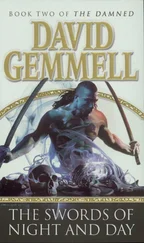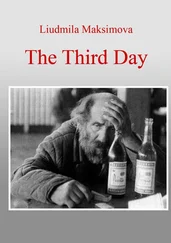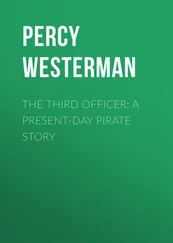David Epperson - The Third Day
Здесь есть возможность читать онлайн «David Epperson - The Third Day» весь текст электронной книги совершенно бесплатно (целиком полную версию без сокращений). В некоторых случаях можно слушать аудио, скачать через торрент в формате fb2 и присутствует краткое содержание. Жанр: Фантастика и фэнтези, на английском языке. Описание произведения, (предисловие) а так же отзывы посетителей доступны на портале библиотеки ЛибКат.
- Название:The Third Day
- Автор:
- Жанр:
- Год:неизвестен
- ISBN:нет данных
- Рейтинг книги:3 / 5. Голосов: 1
-
Избранное:Добавить в избранное
- Отзывы:
-
Ваша оценка:
- 60
- 1
- 2
- 3
- 4
- 5
The Third Day: краткое содержание, описание и аннотация
Предлагаем к чтению аннотацию, описание, краткое содержание или предисловие (зависит от того, что написал сам автор книги «The Third Day»). Если вы не нашли необходимую информацию о книге — напишите в комментариях, мы постараемся отыскать её.
The Third Day — читать онлайн бесплатно полную книгу (весь текст) целиком
Ниже представлен текст книги, разбитый по страницам. Система сохранения места последней прочитанной страницы, позволяет с удобством читать онлайн бесплатно книгу «The Third Day», без необходимости каждый раз заново искать на чём Вы остановились. Поставьте закладку, и сможете в любой момент перейти на страницу, на которой закончили чтение.
Интервал:
Закладка:
We all would.
Chapter 44
A different servant was waiting for us as we trudged up the last set of steps. He opened the door and guided us in. After filling our goblets, he returned to his post outside.
We all chugged our wine fast, and Lavon and I watched cautiously as Markowitz took a few halting steps toward the window. Though he didn’t seem like the type to throw himself out, I eased myself closer just in case.
I needn’t have worried. He simply leaned on the windowsill for several minutes, watching the priests go about their business in the Temple compound below.
Suddenly, though, he turned around and hurled his empty goblet across the room.
“I’m going to kill every one of those Roman sons of bitches!” he shouted.
Lavon and I glanced at each other but decided to let him vent.
When he finally ran out of steam, I retrieved his goblet and poured him another cup.
“I know you’re upset,” I said. “But for the moment, we need to focus on getting Sharon back, and then making our way home.”
Markowitz didn’t give her a second thought. “I mean it,” he exclaimed. “I’m coming back. Those people are animals!”
He stood up, walked back to the window, and once again gazed at the crush of worshippers flowing into the Temple courtyard.
“I never paid much attention, growing up,” he muttered.
“Paid attention to what?” asked Bryson.
He gestured toward the Temple. “To this ; to my heritage. I heard all the stories of course, but why should a kid growing up in the late twentieth century care? My family has lived in America since the time of George Washington. We had gotten rich. This stuff was ancient history.”
None of us replied.
“I was wrong. I should have paid more attention.”
He lowered his head and stared at the floor, mumbling something about being the only Jew in New York who hadn’t lost any known relatives to the Holocaust.
This triggered another unpleasant thought.
“Robert,” he asked, “When the Romans destroyed this city, how many people died?”
Lavon’s first response was evasive. He could sense where this was heading.
Markowitz, though, wouldn’t let up. “I’m not asking for an exact count. Roughly speaking, how many died in the siege?”
“The most plausible figures hover around a million,” Lavon said.
“One million dead Jews?”
“Yes — for the whole war, not just here in Jerusalem.”
“You’re saying these Roman swine killed one million of my ancestors?”
“It’s a bit more complicated than that,” he replied.
Lavon explained that as the siege progressed, three bands of Jewish fanatics took control of separate areas of the city. One occupied the Temple Mount; another controlled the Upper City around Herod’s palace, while a third held the district to the south.
As is often the case in such circumstances, each of the factions first slaughtered anyone they considered a moderate, before they turned against each other with as much gusto as they fought the Romans.
In the process, most of the Jerusalem’s food supply went up in smoke; and a city that might have held out for several years fell in six months.
This information, however, did not faze Markowitz.
“You said earlier that the Romans allowed refugees from other parts of Judea to stream into the city in the hopes they would eat through the grain stores even faster.”
“They did,” admitted Lavon.
Markowitz just shook his head. “Bastards!”
When he turned back to face the Temple, I refilled his goblet once more. With luck, he wouldn’t pay attention to how much he was drinking.
“The Ninth of Av,” he muttered. “I thought all that stuff was just something old people worried about.”
Markowitz continued to rant; none of us attempted to stop him.
“The Ninth of Av?” asked Bryson.
“The saddest day in Judaism,” said Lavon, “the day in their calendar when both the first and second Temples were destroyed.”
“The same day?” asked Bryson.
Lavon shrugged. “Close enough; probably.”
Markowitz turned back to our table. “The destruction of the Temple wasn’t the end of the fighting, was it? Weren’t there other revolts?”
Lavon nodded. Historians had recorded two: an uprising in 115 called the Kitos War after the Roman general sent to suppress it, and a final explosion of fury in 132, known as the Bar Kochba revolt.
“How many Jews died in each one?” Markowitz asked.
“Nobody’s really sure,” Lavon said. “We know even less about those conflicts than we do about the AD 70 siege. If either of the latter rebellions had the equivalent of a Josephus to chronicle the event, his writings haven’t survived.”
“What are the best estimates?”
“Accounts of the Kitos War only describe ‘a great slaughter.’”
Lavon didn’t elaborate, though after what we had seen so far, a mental picture of what that entailed required no huge imaginative leap.
“What about Bar Kochba?” Bryson asked.
Like most people outside Judaism and the Biblical scholar community, I had never heard of the man. I had no idea that this warrior — a messianic figure whose name translated as “Son of the Star” — had led the greatest rebellion of all.
Lavon explained that around AD 130, the emperor Hadrian — the same man who leveled the early Christians’ shrine — visited Jerusalem and decided to rebuild it as a pagan city along Roman lines.
For starters, he issued decrees outlawing Jewish customs like circumcision, which the Romans considered mutilation. But his crowning insult was his plan to build a shrine to Jupiter on what remained of the Temple Mount.
“What happened?” asked Bryson.
“As any fool could have predicted, the Jews rebelled,” Lavon said. “And in contrast to the situation sixty years earlier, this time Jewish resistance was unified.
“Ultimately, the Romans had to bring in twelve legions to put down the revolt — almost half their entire army at the time. The fighting dragged on for three years. Roman historians described their own casualties as enormous.”
“How many Jews died?” asked Markowitz.
“That’s even more of a guess than Josephus’s war, and I’m not trying to evade the question. Unlike the Great Revolt, the Bar Kochba rebellion didn’t end with the siege and fall of a major city. Instead, the last surviving rebels fled with their families to hideouts in caves.
“Rather than suffer even more casualties rooting them out, the Romans simply sealed up the cave entrances as they discovered them. The people inside eventually starved. Some of my colleagues have unearthed whole clusters of their skeletons.”
“So how many died?” asked Markowitz.
“Cassius Dio said about 500,000. Others cite figures in the millions.”
“Take an average; about a million, then?”
Lavon shrugged. “I suppose.”
“A million here, a million there,” said Markowitz. “It was as if the Nazis had risen up and had another go at us — twice!”
“Come on now,” said Bryson. “The Romans weren’t Nazis. There’s no record of their going for all that racial purity crap or trying to exterminate the entire population.”
Markowitz didn’t answer. Instead, he just stared out the window for a few minutes before turning back to face us.
He spoke with a subdued voice. “All we wanted was our small piece of land. We had our place, our Temple. They destroyed it and cast us out of our ancestral home forever — people who had done them no harm.”
“Don’t tell me you’d want to go back to sacrificing lambs and doves, literally?” said the Professor.
Markowitz stared down at the floor, lost in thought.
Читать дальшеИнтервал:
Закладка:
Похожие книги на «The Third Day»
Представляем Вашему вниманию похожие книги на «The Third Day» списком для выбора. Мы отобрали схожую по названию и смыслу литературу в надежде предоставить читателям больше вариантов отыскать новые, интересные, ещё непрочитанные произведения.
Обсуждение, отзывы о книге «The Third Day» и просто собственные мнения читателей. Оставьте ваши комментарии, напишите, что Вы думаете о произведении, его смысле или главных героях. Укажите что конкретно понравилось, а что нет, и почему Вы так считаете.












